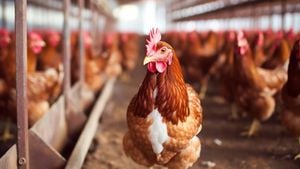Canadian premiers are rallying together to address US President-elect Donald Trump's recent tariff threats, which could impose significant taxes on goods imported from Canada and Mexico. This development is causing widespread concern among provincial leaders, primarily due to the potential economic fallout across various sectors dependent on cross-border trade.
British Columbia Premier David Eby voiced alarm before the first virtual meeting between provincial leaders and Prime Minister Justin Trudeau, stating the proposed 25% tariffs on Canadian imports would be "devastated" for the province's lumber and forestry sectors, which are already strained under existing duties amid the long-standing U.S.-Canada lumber dispute. Eby clearly articulated the absurdity of such tariffs, noting they would lead to increased building costs for American consumers, making it counterintuitive for Trump's aim of reducing costs for his electorate. "It’s going to result in more-expensive wood for building homes and building things in the United States. (It) doesn’t make any sense," he remarked.
Alberta Premier Danielle Smith, along with Quebec Premier François Legault, joined Eby by recognizing the legitimacy of Trump's concerns about border security. Smith has expressed the need for stronger action from Ottawa to truly address these issues. Legault emphasized the importance of presenting solid plans to convince Trump of Canada’s efforts to secure its borders. "The federal government has to understand the legitimate concerns of the United States," Legault pointed out.
After the meeting, Deputy Prime Minister Chrystia Freeland highlighted the necessity of unity among the provinces and federal government to navigate Trump's tariff threats, emphasizing cooperation over internal discord. "We need to be smart, strong and united," Freeland said, stressing the importance of presenting a collective front against these unjustified trade measures.
The meeting transpired following Trump's declaration threatening tariffs if Canada and Mexico fail to curb illegal border crossings and drug trafficking. Despite valid concerns over border security raised by Trump, Canadian officials, including Eby and other premiers, insist the tariff plan is disproportionate and will likely backfire. The influx of less expensive Canadian goods, such as raw materials, is pivotal for the U.S. economy, contradicting the justification for such punitive measures. Officials pointed to extensive bilateral trade, with nearly $3.6 billion worth of goods exchanged daily between the U.S. and Canada, underscoring Canada’s integral role as America's top oil supplier, along with various other commodities.
Manitoba Premier Wab Kinew underscored the need for solid diplomatic dialogues with both the federal government and U.S. counterparts, stating, "This is not the time for tiptoeing around; we need direct and mature communication." Kinew has urged the federal government to increase its investment, not only for border security but also to reinforce community safety measures amid rising drug concerns.
Kinew has been vocal about the unique position Manitoba holds due to its geographic proximity to the U.S. with significant agricultural exports and has indicated how tariffs would potentially send the province spiraling toward recession. He remains hopeful for upcoming trips to Washington D.C. to strengthen trade relations post-Trump's inauguration.
Recently, prominent figures like Claudia Sheinbaum, President of Mexico, have also signaled readiness to formulate retaliatory tariffs against the U.S., illustrating the urgency and seriousness of the economic climate following Trump's statements. Both Canada and Mexico are bracing for potential economic impacts and have been assessing their strategies to counteract Trump's aggressive tariff threats.
The precarious nature of tariffs and their potential to incite full-fledged trade wars has not gone unnoticed, as analysts have discussed the adverse effects on consumers and various industries reliant upon seamless trade relationships. The dairy and agricultural sectors particularly fear reverberations from retaliatory measures similar to those seen during previous tariff conflicts.
Trade associations within the U.S. have echoed sentiments against overarching tariff policies, warning of inflationary pressures on consumer goods and the chain reactions triggered within commodity markets. Corporate leaders recognize the importance of Canadian imports for U.S. manufacturing and energy sectors, articulately advocating for increased cooperation rather than conflict as both nations stand at this precarious juncture.
With plans for enhanced collaboration among Canadian provinces underway, officials are optimistic about creating strategies ensuring both countries can avoid the pitfalls of tariff wars, which historically have resulted in detrimental outcomes.
It’s not just about protecting domestic interests; this scenario presents the opportunity to reshape future trade dialogues with the incoming U.S. administration. The roadmap laid out reflects the pressing need for cohesive action, reminding all parties involved of the long-standing alliance and mutual dependencies spanning the U.S.-Canada border.
For now, Canadian officials are left to contemplate strategizing their responses to Trump’s threats, aligning their actions with Canada’s agricultural, energy, and manufacturing sectors poised to feel the brunt of any worsening relations. All eyes will be on how the federal and provincial leaders pave the path forward amid this challenging economic chapter.
Trump's tariffs have been framed within the complicated backdrop of immigration and drug trafficking dialogues, yet, the Canadians affirm their position: this type of punitive approach must give way to meaningful dialogue and cooperation, prioritizing bilateral trade relations over shadowy tariffs.



